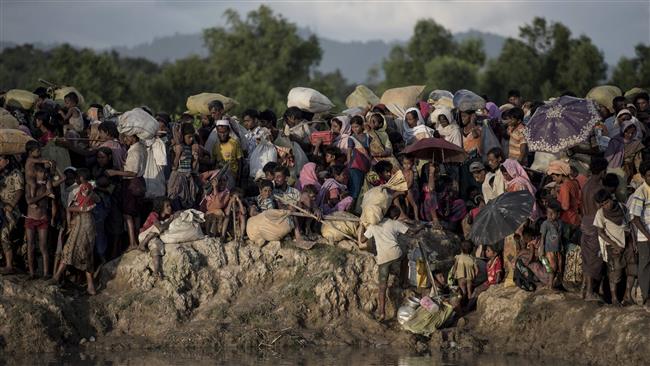
RNA - Last month, Myanmar’s army, which has rejected irrefutable accounts of violence against the Rohingya Muslim community in the state of Rakhine, said officers had found a mass grave in Maungdaw township, where some of the worst atrocities committed by the army troops were reported.
"Some villagers from Inn Din village and security members confessed they killed 10 Bengali terrorists," the military chief’s office said in a Facebook post about the September 2 killings, using a pejorative term for the Rohingya killed in the village.
The public admission of wrongdoing is the military's first since it launched "clearance operations" against ethnic Rohingya in August, prompting more than 650,000 to flee into neighboring Bangladesh in what the United Nations has called "ethnic cleansing."
In related news a court in Yangon on Wednesday charged two Reuters journalists, who were investigating the mass grave and covered the ongoing state-sponsored crackdown against Rohingya Muslims in Myanmar, with the possession of "important and secret government documents related to Rakhine State and security forces."
The European Union called on Myanmar's authorities to release the two journalists. The 28-nation bloc, which is a significant donor to Myanmar, said it expected “Myanmar authorities to ensure the full protection of these journalists' rights and to release them as quickly as possible."
Calls from Brussels were also echoed across Europe. France on Wednesday also urged the immediate release of the pair, saying, "Journalists must be able to exercise their profession freely, without fear of being intimidated or arrested."
The world community accuses the military of widespread atrocities against Rohingya, including killings, rapes and burning of homes. However, the military has until now adamantly insisted that there has been no wrongdoing by security forces.
The government of Buddhist-majority Myanmar brands more than one million Rohingya Muslims in the country as “illegal immigrants” from Bangladesh, refusing to accept Rohingya Muslims as its citizens despite living in the country for many generations.
They are widely called "Bengalis” and considered by the UN as the “most persecuted minority group in the world.”
Since August 25 Myanmar's military has launched a new wave of violence, forcing the Muslims to flee to neighboring Bangladesh where they live in dire conditions despite the international community's struggle to help the persecuted community.
847/940